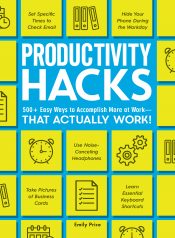In her new book “Productivity Hacks: 500+ Easy Ways to Accomplish More at Work,” Emily Price has collected hundreds of tips aimed at helping you use technology to your advantage, schedule your time wisely, and get better organized.

It’s the kind of handy guide you can flip open to any page and find a quick fix or have an “aha!” moment. While it may not be rocket science, it’s an extremely motivating read. Besides, sometimes all you need is a quick friendly nudge to get on a more productive path.
Five Hacks for Home Work
Since more of us choose to telecommute or work remotely, here are a handful of hacks from Price to help you stay focused while working at home.
- Plan out everything. When you work from home, you are your own secretary, so plan out things like email time and breaks so they feel more set in stone and you don’t accidentally overcommit yourself. The more prepared your schedule is, the easier it will be to keep yourself on task! Also, since working at home means you have more wiggle room to figure out when you are most productive, adjust your schedule so that you’re working — especially on big projects — during those hours of peak productivity. You can spend less productive hours on more simple tasks like responding to emails. Combine your calendar and to-do list with the Sunsuma app — described “as if Trello and Google Calendar had a baby.”
- Make your office yours — and make it off-limits. If your home office is in your kids’ outgrown bedroom or playroom, you’re going to notice and get distracted by the decor. Make it yours by painting it and decorating it in a way that supports your workflow. Create a space where you feel comfortable with as few distractions as possible. That means keeping your guitar and video game system somewhere else. Also, don’t allow others to be in the same room with you while you’re trying to get work done, even if they promise to be extra quiet. If you wouldn’t have your husband read a newspaper across from your desk at the office, then he shouldn’t be sitting across from your desk at home either. Need background noise to focus? The Noisli app lets you create your own mix of white, pink or brown noise to create the perfect soundtrack for your workday.
- Get a work-only phone line. When you work from home, your home phone can quickly turn into your work phone. Having business calls come to your personal cellphone might not seem like a problem at first, but it means you won’t be able to turn them off when you’re on vacation and that you have to keep your personal cell by your side during work hours — which will be a distraction. Instead, consider getting a dedicated work number that you pass out to business-related contacts. If you don’t want to buy a dedicated work phone, Google Voice gives you a special number on top of your existing number to associate with your cellphone or to forward to another phone or your email account.
- Practice prolonged concentration. You can train yourself to work for prolonged periods of time without getting distracted by things around the house. Start by working for 30 minutes at a time with a five-minute break, then scale that time up in 10-minute increments until you are able to work for two hours or more without interruption. During the training portion, set an alarm on your phone to let you know when your time is up. Once you’ve trained yourself to handle longer periods of time, you won’t know how doing so was ever a problem. The app Tide helps you track periods of work and rest and offers ambient sound options like rain to help you stay focused.
- Complete stressful tasks outside of your home. When you’re exceptionally stressed, you’re more susceptible to getting distracted from your work. It’s like having a fight-or-flight response. You’ll be susceptible to going into “flight” mode and toward doing your dishes or mopping the kitchen floor. If you take stressful tasks somewhere else, you’ll be able to work on them with fewer distractions, and you won’t associate your home with that stress. (Related: “A Third Place Can Be the Best Place to Work.“)
Note: Tips excerpted from Productivity Hacks: 500+ Easy Ways to Accomplish More at Work—That Actually Work! By Emily Price Copyright, © 2018 published by Adams Media, a division of Simon and Schuster. Used by permission of the publisher. All rights reserved.

















